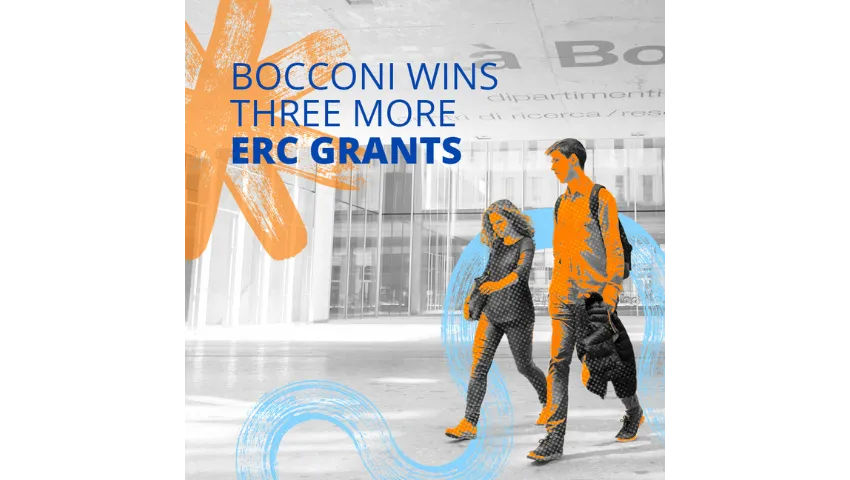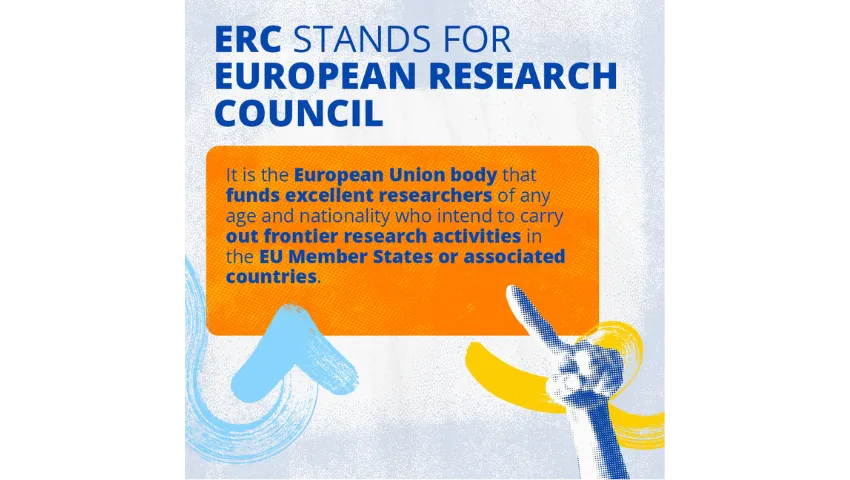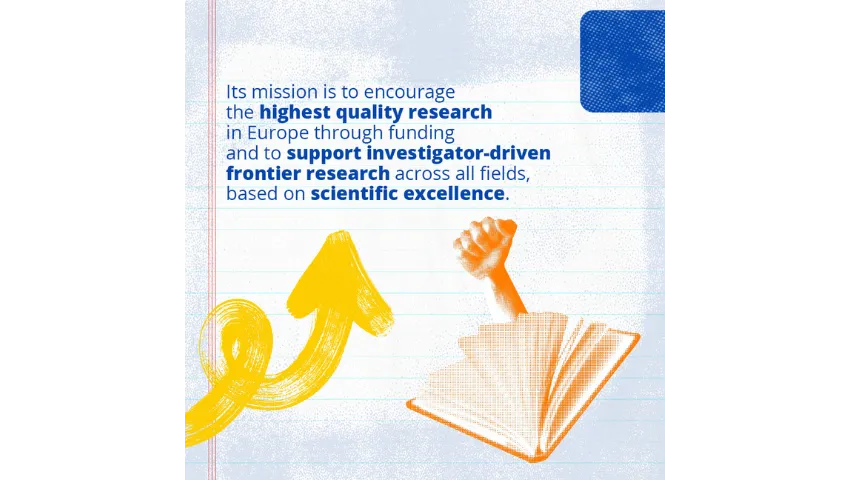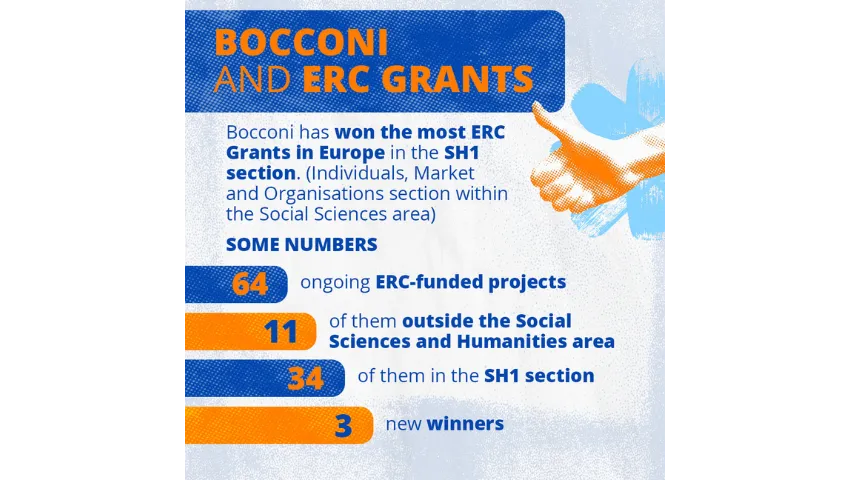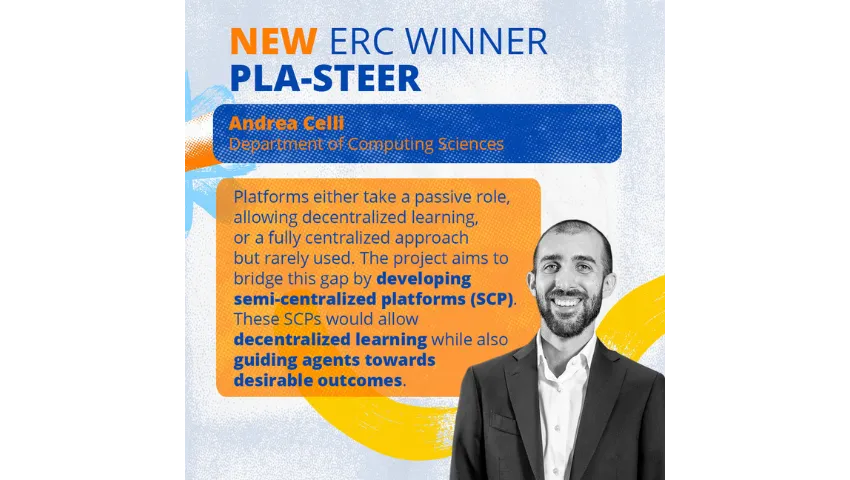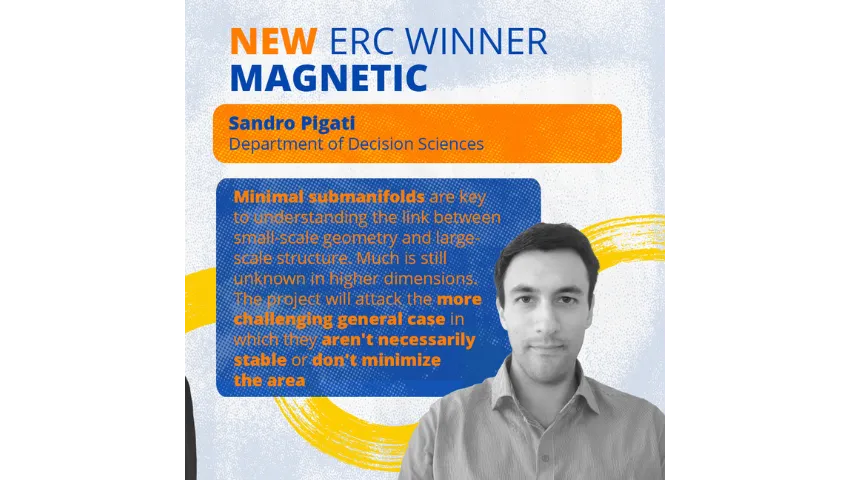
Bocconi Research Wins Three New European Grants
Three research projects proposed by Andrea Celli, Alessandro Pigati and Carlo Schwarz have won as many ERC Starting Grants, awarded on a competitive basis by the European Research Council to researchers in the early stages of their careers (2 to 7 years after completion of a PhD). The total amount of the three grants exceeds 4 million euros. With these 3 projects, Bocconi brings the total amount of ERC-funded research at any career level to 64. Notably, Bocconi is the top institution in Europe in the “Individuals, Markets and Organizations” disciplinary area with 34 projects.
The European Research Council announced today this year’s 494 Starting Grants totaling 780 million euros. The funding will be used to launch new projects and train new research teams. Italian research institutions were awarded 41 grants, while Italian researchers (including those working abroad) won 61, which gives Italy second place after Germany in terms of nationality of winning researchers.
A total of 3,474 proposals had been submitted, with a success rate of 14.2 percent. Bocconi, with 3 projects accepted out of 7 proposed, is therefore with 42% well above this European average.
Francesco Billari, Rector of Bocconi University, expresses his satisfaction this way, “Bocconi is in its own right a STEM university and the three ERCs won by our researchers in three such different disciplinary areas ranging from social sciences to mathematics to artificial intelligence also prove this. Our increasingly quantitative approach to the social sciences, with the growing aid of machine learning and computational science is instrumental in our mission to train future-proof young people.”
Here is an outline of the three winning projects:
1. PLA-STEER (Celli)
The PLA-STEER project, LED BY Andrea Celli of the Department of Computing Sciences, focuses on scenarios in which multiple machine learning algorithms interact on a shared platform. This is the case, for example, in many financial exchanges and online advertising platforms. These platforms usually take a passive role in the interactions, providing the shared infrastructure but keeping individual learning algorithms fully decentralized. The project aims at establishing the theoretical foundations for new platforms that can take an active role in the interactions among its users, enabling outcomes that are more predictable and that improve aspects such as fairness and social welfare. The research will use tools from online learning and game theory to better understand learning dynamics, address computational challenges, and devise new algorithms and mechanisms to run these new platforms.
2. MAGNETIC (Pigati)
Alessandro Pigati, of Bocconi’s Department of Decision Sciences, is in charge of the MAGNETIC project. This research aims to explore and solve complex mathematical problems related to special shapes and surfaces in higher dimensions. These shapes, known as "minimal submanifolds," are crucial in understanding the relationship between small-scale geometry, like curvature, and large-scale structure, like the overall appearance of an object. While mathematicians have made significant progress in studying these shapes in simpler cases, much remains unknown when dealing with more complicated, higher-dimensional situations.
The project will investigate how these shapes behave, attacking the more challenging general case in which they aren't necessarily stable or don't minimize area. The research also draws connections to physical phenomena, where the energy density tends to concentrate around such shapes.
3. CHAIN (Schwarz)
Carlo Rasmus Schwarz, of the Department of Economics, will conduct the CHAIN project. This research project is focused on understanding how social networks influence the behavior of different groups: scientists, politicians, and ordinary citizens. It consists of three interrelated studies.
The first study looks at how social media, particularly X, affects the work of scientists. By analyzing the X activity of economists, the research will explore how their online networks influence what information they find, how they collaborate, and the overall direction of their research. It will also examine whether social media leads to trends or "fads" in science that might not be beneficial.
The second study investigates the role of congressional staffers in shaping U.S. policy. Using detailed data on staffers' backgrounds and their networks, this research will explore how these often behind-the-scenes players influence the decisions and priorities of Congress members. This study aims to uncover how these staffers impact voting behavior and policy outcomes.
The third study examines the political impact of social media in India, specifically focusing on the messaging platform WhatsApp. It will analyze how a change in the platform's sharing policies—designed to limit the spread of information—affects conflict, beliefs, and election results in the world's largest democracy. This research will provide important insights into the effectiveness of such policy interventions in social media.
